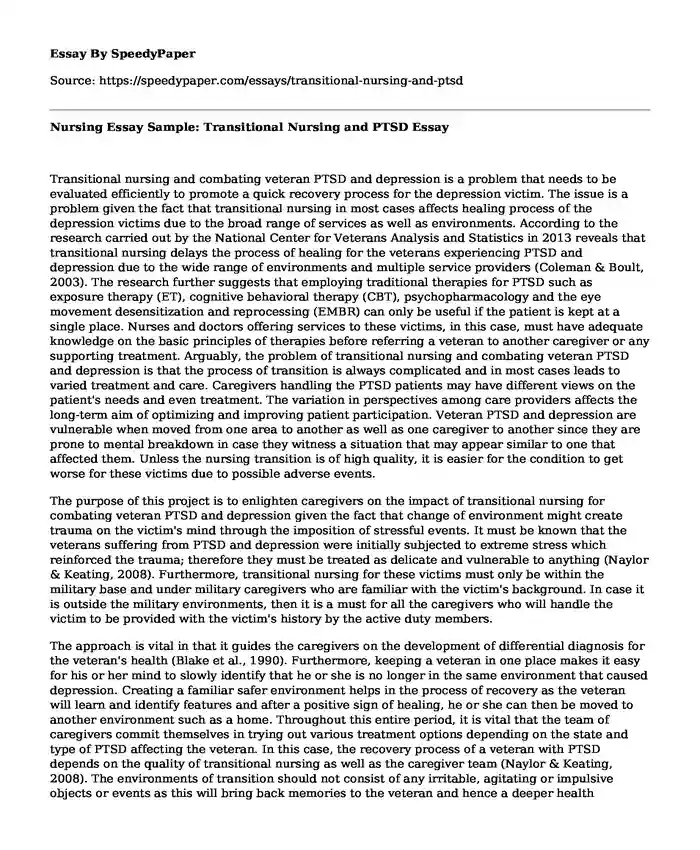
| Type of paper: | Research paper |
| Categories: | Nursing Post traumatic stress disorder |
| Pages: | 3 |
| Wordcount: | 729 words |
Transitional nursing and combating veteran PTSD and depression is a problem that needs to be evaluated efficiently to promote a quick recovery process for the depression victim. The issue is a problem given the fact that transitional nursing in most cases affects healing process of the depression victims due to the broad range of services as well as environments. According to the research carried out by the National Center for Veterans Analysis and Statistics in 2013 reveals that transitional nursing delays the process of healing for the veterans experiencing PTSD and depression due to the wide range of environments and multiple service providers (Coleman & Boult, 2003). The research further suggests that employing traditional therapies for PTSD such as exposure therapy (ET), cognitive behavioral therapy (CBT), psychopharmacology and the eye movement desensitization and reprocessing (EMBR) can only be useful if the patient is kept at a single place. Nurses and doctors offering services to these victims, in this case, must have adequate knowledge on the basic principles of therapies before referring a veteran to another caregiver or any supporting treatment. Arguably, the problem of transitional nursing and combating veteran PTSD and depression is that the process of transition is always complicated and in most cases leads to varied treatment and care. Caregivers handling the PTSD patients may have different views on the patient's needs and even treatment. The variation in perspectives among care providers affects the long-term aim of optimizing and improving patient participation. Veteran PTSD and depression are vulnerable when moved from one area to another as well as one caregiver to another since they are prone to mental breakdown in case they witness a situation that may appear similar to one that affected them. Unless the nursing transition is of high quality, it is easier for the condition to get worse for these victims due to possible adverse events.
The purpose of this project is to enlighten caregivers on the impact of transitional nursing for combating veteran PTSD and depression given the fact that change of environment might create trauma on the victim's mind through the imposition of stressful events. It must be known that the veterans suffering from PTSD and depression were initially subjected to extreme stress which reinforced the trauma; therefore they must be treated as delicate and vulnerable to anything (Naylor & Keating, 2008). Furthermore, transitional nursing for these victims must only be within the military base and under military caregivers who are familiar with the victim's background. In case it is outside the military environments, then it is a must for all the caregivers who will handle the victim to be provided with the victim's history by the active duty members.
The approach is vital in that it guides the caregivers on the development of differential diagnosis for the veteran's health (Blake et al., 1990). Furthermore, keeping a veteran in one place makes it easy for his or her mind to slowly identify that he or she is no longer in the same environment that caused depression. Creating a familiar safer environment helps in the process of recovery as the veteran will learn and identify features and after a positive sign of healing, he or she can then be moved to another environment such as a home. Throughout this entire period, it is vital that the team of caregivers commit themselves in trying out various treatment options depending on the state and type of PTSD affecting the veteran. In this case, the recovery process of a veteran with PTSD depends on the quality of transitional nursing as well as the caregiver team (Naylor & Keating, 2008). The environments of transition should not consist of any irritable, agitating or impulsive objects or events as this will bring back memories to the veteran and hence a deeper health problem. Therefore transitional nursing for the veteran should trigger peaceful thoughts and emotions as these are vital for a quick healing process for any PTSD and depression victim.
References
Blake, D. D., Keane, T. M., Wine, P. R., Mora, C., Taylor, K. L., & Lyons, J. A. (1990). Prevalence of PTSD symptoms in combat veterans seeking medical treatment. Journal of Traumatic Stress, 3(1), 15-27.
Coleman, E. A., & Boult, C. (2003). Improving the quality of transitional care for persons with complex care needs. Journal of the American Geriatrics Society, 51(4), 556-557.
Naylor, M., & Keating, S. A. (2008). Transitional care. Journal of Social Work Education, 44(sup3), 65-73.
Cite this page
Nursing Essay Sample: Transitional Nursing and PTSD. (2022, Feb 28). Retrieved from https://speedypaper.net/essays/transitional-nursing-and-ptsd
Request Removal
If you are the original author of this essay and no longer wish to have it published on the SpeedyPaper website, please click below to request its removal:
- Free Essay: Self-improvement According to Jonathan Edward
- SWOT Analysis of Coach Inc - American Fashion Essay Example
- Intermediate Sanction Essay Example
- Free Essay Example: Macro and Microlinguistics in Saudi Arabia
- Free Essay on Social Workers Helping Refugees Transition
- Essay Sample on Application of Lao-Tzu's Concept in Real Life
- Free Essay Example - Flynn Effect
Popular categories




